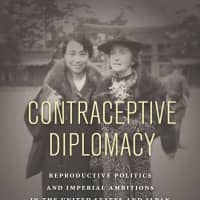Margaret Sanger, an American advocate of birth control, visited Japan several times in her lifetime, and even requested that her heart be buried in Tokyo out of "gratitude to the Japanese people and government." Aiko Takeuchi-Demirci contextualizes this transpacific activist and the networks that facilitated her travels, illuminating a history that shapes debates about women's health and reproduction rights still taking place in both Japan and the States today.
Contraceptive Diplomacy, by Aiko Takeuchi-Demirci.
336 pages
STANFORD UNIVERSITY PRESS, Nonfiction.
The general arc of Takeuchi-Demirci's narrative is one in which transnational feminist "women rebels" initiated conversations about birth control as a tool to help liberate women economically, sexually and physically, but powerful state interests soon came to define the ways in which medical professionals and politicians advocated or opposed the development and dissemination of contraceptive technologies. In an accessible scholarly style, the book illuminates how the world of Sanger and transnational Japanese birth control activists such as Shizue Ishimoto (later Kato) both differed from today's and yet shared some similar problems. It traces a longer history of the conflicts and collaborations we still live with in feminist, activist and policy-making circles.
In covering the pre-World War II and postwar eras, Takeuchi-Demirci makes a case for understanding historical individuals like Sanger and Ishimoto beyond an isolated national context, and gives us a nuanced history alert to the various intersecting power dynamics at play: gendered, ethnocentric, socioeconomic, technocratic and orientalist.



















With your current subscription plan you can comment on stories. However, before writing your first comment, please create a display name in the Profile section of your subscriber account page.